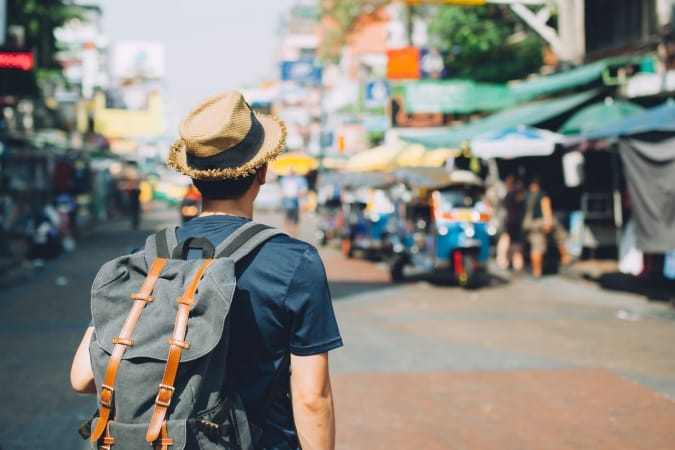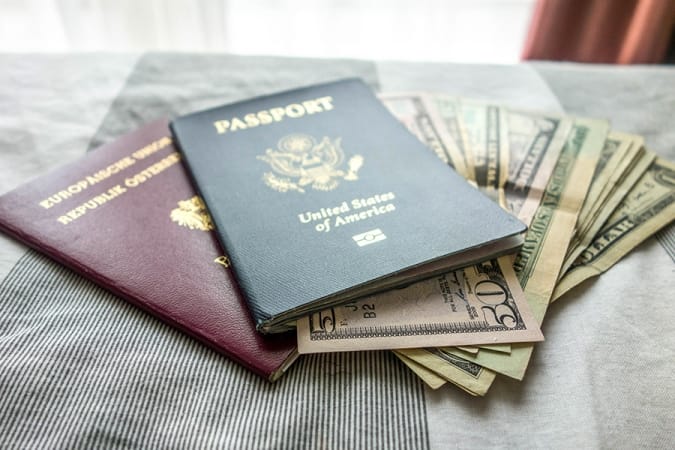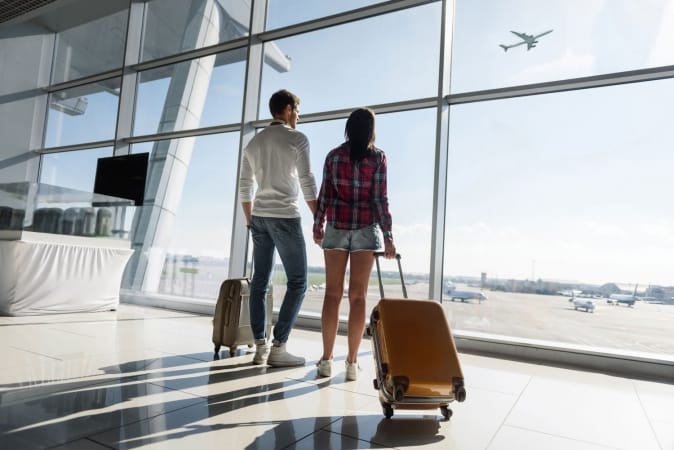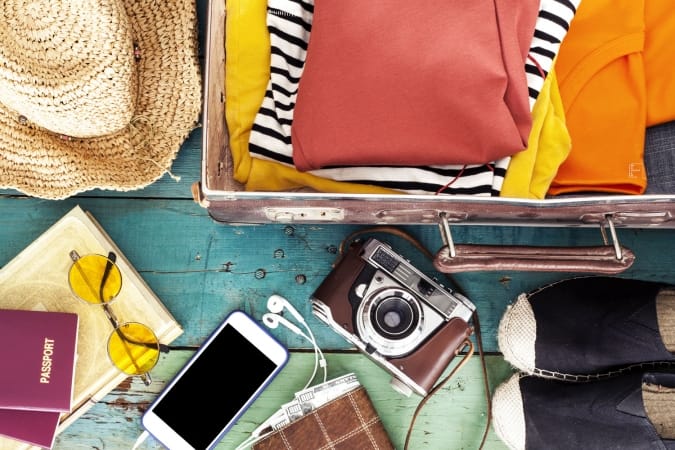Traveling the world visiting new countries and places can be a lot of fun. Until it isn’t. Things going wrong is basically a rite of passage for travelers. You’ll never know what misfortune is coming your way, whether it be a lost wallet, a scam artist, a pickpocket, or something more severe.
It’s important you understand the realities of travel and know some basic travel safety tips to help you stay aware. That way you can be prepared in the unlikely event that they happen to you. These travel safety tips should help you both identify travel problems and allow you to avoid them, or at least lessen their impact.
1. Don’t Flash Your Valuables
The golden rule for not having your valuables stolen is to look like someone with nothing worth stealing. As soon as people see you flashing about expensive jewelry or electronics like cameras, phones, and laptops, they know what they can take from you. To avoid this, you can either not bring these things out with you in public during the day, or be a little more discreet with them. Think about tucking jewelry away under clothes and only bringing out your expensive electronics when you really need them. Ask yourself what you really need on your trip and leave unnecessary valuables at home.
2. Know Common Travel Scams
Many people see tourists as a great way to make a living, but unfortunately some go about it by tricking, deceiving, or outright extorting money from travelers through scams. There’s simply not enough space in this travel safety article to list every travel scam out there. And every country seems to have its own varieties. There’s the closed palace scam in Bangkok, and the tea scam in China, as well as global scams like taxis with a broken meter. What you can do is do a quick Google search about scams in your destination so you have an idea of what to look for.
3. Know the Local Emergency Info
Should something go wrong while you’re travelling, you need to know how to get help. This could be from the police, fire department, ambulance, or even your embassy. For each of those services, you’ll want to know the phone number, as well as where your embassy or consulate is located in the country you’re in. Just because it’s 911 in your home country doesn’t mean that will work where you are. You’ll often find emergency numbers on safety cards or emergency exit plans in hotels and hostels. Still, it’s best to do a quick Google search before your trip and write them down, either on paper or in your phone. For a list of emergency numbers abroad you can also check out this wiki article.
4. Stop Using Your Back Pocket
One of the smallest changes you can make to stay safe while traveling is to not put valuables in your back pocket. For pickpockets, the back pocket of your pants is one of the easiest places to steal from. Instead, put your phone, wallet, money, passport etc. in your front pocket where it’s safer.
If you are really concerned about pickpockets, you could also get a money belt.
5. Get Travel Insurance
There’s a common saying among the travel community, “If you can’t afford travel insurance, you can’t afford to travel.” A big part of travel is the surprises you find along the way, unfortunately they’re not always good or cheap ones. From accidents that leave you with giant medical bills, to situations that leave you with legal expenses or unexpected delays, travel insurance can be a life saver. It’s always best to do your research to find out what policies cover so that you can find the policy for you. We recommend SafetyWing for trips less than one year. If you are planning to stay abroad for longer than that, it’s best to get global health insurance instead of travel insurance.
6. Carry a Copy of Your Passport
Of the things you don’t want to lose on an international trip, your passport is at the top of the list. Without it you’re going to have real trouble, so naturally you want to protect it at all costs. By having it out and about without you, there’s a risk that it could be stolen, lost, or damaged.
To help you avoid this scenario, it’s a good idea to carry a photocopy of your passport around instead and leave your passport in a safe at your accommodation. While not as good as the real thing, having a photocopy will allow you to prove your identity in the short term should the need arise. Regardless of whether you carry it with you, it’s always good to have a photocopy just in case.
7. Know Your Limits
Often enjoying yourself overseas can mean going for drinks with old or new travel companions, but it’s best not to let yourself get too drunk while you’re out. Not only does being drunk impair your judgement and make it more likely that you’ll find yourself in dangerous situations, but it can also signal to predators that you’re easier to take advantage of. If you drink to the point of passing out, those risks only increase.
8. Never Take Illegal Drugs in a Foreign Country
Some people take the fact that they’ve left their home country as permission to do what they like without thinking things through. While it might feel freeing, the consequences may be even more severe than you’re used to back home. This definitely applies to taking illegal drugs when you’re abroad, where laws may be more strict, or police more corrupt.
There are countries, for example in South East Asia, where drug offenses can be punished with long prison sentences or even a death sentence. In other places, police may ask for hefty bribes if they catch you in possession of drugs. Basically, just because getting drugs can be easier in other countries doesn’t mean the laws there are easier on those who get caught.
9. Avoid Traveling Alone at Night
It should be no surprise that some safety tips apply just as much when traveling as they do back home. A perfect example is not traveling alone at night. It’s hardly news that being out alone after dark is more dangerous than during the day, so why would it be any different abroad? It’s best to travel in groups at nighttime to help make sure you and your friends get back to your accommodation safely.
10. Get Your Travel Vaccinations
Traveling the world exposes you to plenty of things you’re not used to, diseases being one of them. One of the best ways to protect yourself against many diseases is to make sure that you’re up-to-date with your vaccinations for things like Tetanus, Yellow Fever, Typhoid, and Hepatitis A. Besides keeping you safe, there are some places that will want to check that you’ve been vaccinated before letting you leave, like with yellow fever in South America and parts of Africa. To know what vaccinations you need, check the Centers for Disease Control and Prevention’s website or sites like Travel Health Pro.
11. Share Your Itinerary With Family and Friends
There’s a number of reasons to let friends and family know your itinerary and know where you are. For starters, they may just want to follow your travels and live vicariously through you. But on a safety note, it’s incredibly important should something unexpected happen in the region you’re traveling through.
If a natural disaster or terrorist attack happens, they’ll want to know if you’re in the area. If they don’t hear from you, they can then alert the police or embassy. Similarly, it can sometimes be tough keeping track of the news while you travel, so friends and family may be able to warn you of incidents that may have escaped your notice.
It’s for all these reasons that you should also consider registering with your embassy and/or inform your country’s foreign affairs ministry or state department about your travel plans. Only when they know where you are can they do anything to help. Every country has their own program but for the US it is the Smart Traveler Enrollment Program.
12. Pack a First Aid Kit
Travel puts you in all sorts of strange and new situations, so it’s little wonder that the odd injury or illness finds its way to you. If it’s something serious you should seek medical treatment, but having a first aid kit with you allows you to take care of the smaller stuff. It only needs to be a basic first aid kit, one that is capable of helping with stomach or digestion problems, cuts, sprains, or insect bites. It may take up a little bit of room in your luggage, but you’ll be glad you have it in the long run.
13. Use a VPN
Staying connected to the internet has become an integral part of modern travel, but it too has its own risks. After all, you’re moving around and hopping onto many different Wi-Fi networks that may not be secure.
First of all, know that public Wi-Fi networks without any encryption are simply not secure. On these networks you can assume that hackers or anyone with know-how can see what you’re doing. For things like Facebook, that may not be great, but it’s downright dangerous if you’re doing things like logging into your bank accounts.
Luckily, there’s an easy solution and that is a VPN, or Virtual Private Network. A VPN creates a secure, encrypted channel, allowing you to use the internet without worrying that your accounts have been compromised. There are both paid and free VPN services, so you’ll need to work out which best suits your needs.
14. Check the State Department Website
A big part of planning your trip is becoming familiar with the destination you’re visiting. This doesn’t mean just finding where to go and how to get around, but also what safety and security factors you’ll want to be aware of.
To find all that you need to know on this front, head to your State Department (US) or Foreign Office (UK) website. They’ll have information on potential problems at your destination be they related to politics, health, terrorism, natural disasters or otherwise. Often they’ll highlight the parts of a country where these issues occur, as problems like these aren’t always countrywide.
While it’s good to take onboard everything these websites say, there are a few caveats. Firstly, they’re more likely to update advice when things go wrong than when they calm down again. Secondly, advice is generally overcautious and is designed to identify problems rather than tell you their likelihood, so some judgement is definitely required when reading them.
15. Don’t Share Too Much With Strangers
One of the best parts of travel is the chance to meet people and make new friends. But that doesn’t mean you need to share everything right away with people you’ve just met. This is naturally going to depend on the situation and your personal feelings, but there are ways to tell if you shouldn’t share details with a person.
Usually a big indicator that you shouldn’t give someone too much personal information is when they ask personal questions early on. While asking your name or where you’re from is fairly standard, questions like where you’re staying or what your Instagram account is can be particularly weird if asked within moments of meeting or completely out of context.
An approach to deal with this kind of behavior is to use white lies to brush off questions without confronting their odd behavior. For questions of where you’re staying, you could say you forget the hotel’s name, use a different hotel’s name nearby or just offer up the name of the neighborhood. Also, the old standard that you’ve got to to meet someone is always a good way to get out of an uncomfortable conversation like this.
16. Stay Healthy: Food & Water Safety
Just as you have to look after your personal safety, you also need to be careful about your health when you travel. Visiting foreign countries often means encountering situations with food and water that can make you seriously ill and the last thing you want is to get sick on holiday.
A simple place to start is ensuring that tap water is safe to drink and use for other things like brushing your teeth. Simply do a quick search online and you should have your answer. As for food, there are plenty of hints that can help you stay healthy. Don’t eat cooked food that has been left sitting around for a while. Avoid dishes like salads or other meals that involve ingredients getting washed but not cooked, as you don’t know what water is being used on them. A good place to start is to go to places where a lot of locals eat as locals know where it’s safe.
17. Hide Emergency Cash
Many of these tips are here to help you avoid travel pitfalls like losing your wallet or having it stolen. However nothing is impossible when it comes to travel. Should something happen and you no longer have your wallet, you’ll be grateful that you stashed some emergency money either on your person or in your room. With $100-200 hidden away, you’ll at least be able to get by until you can sort the situation out.
18. Travel Light
While it’s nice to have all your favorite clothes, items, and accessories with you when you travel, too much of it can lead to having some pretty heavy luggage. Having so much to carry can create problems down the road and often isn’t even that necessary. It also means you have more to keep track of as you pack and unpack each destination, meaning you’re more likely to lose things along the way.
Lugging around an overly heavy luggage or backpack like an 80-litre pack is going to slow you down and make getting around a tiring experience. Running late and feeling exhausted aren’t much fun sure, but they’re both states of mind that can lead to poor decision making and create whole new problems for you to deal with. Then there’s the simple fact that a huge backpack can make you further stick out, possibly inviting unwanted attention.
If you are backpacker, consider getting a backpack like the Osprey Farpoint 40. It can be used as a carry-on and it’s the perfect size for short and long trips.
19. Lock Your Stuff
Good hotels and hostels are designed to make you feel at home. The problem with feeling at home is that you sometimes forget that unlike at your home, you don’t know who could have access to your stuff when you’re not around. So leaving valuables just lying around in your room or dorm is asking for trouble.
People are more likely to steal when easy opportunities present themselves, so don’t give them the opportunity in the first place. Make the most of hotel safes. And while locking away items in your luggage won’t stop a truly determined thief, it will remove easy temptation. As for hostels, it’s best to check that they offer lockable storage lockers before you book your stay.
If you’re separated from your luggage on buses, planes or trains, lock it up with a luggage lock since you won’t be able to get into it anyway. This also goes for night buses and trains when you won’t be able to keep an eye on your belongings while you sleep.
20. Use ATMs in Banks
Chances are you’re going to need to get money out while you’re away, which typically means finding an ATM. Just as people can tamper with ATMs back in your home country, so can they in the countries you’re visiting. The difference is that resolving debit/credit card problems is much easier when you’re at home than when you’re abroad. To lower the chances of this happening, it’s best to find ATMs in banks as they’re likely able to monitor their machines better.
Following this advice will also mean you won’t fall into the trap of being charged outrageous fees or exchange rates by certain ATM providers like Euronet.
21. Carry a Decoy Wallet
Getting mugged or pickpocketed is not something you want to experience, but it’s an unfortunate possibility in some travel destinations. A good strategy to minimize your losses is to carry around a decoy wallet with you. Putting a little money or foreign currency, along with expired credit cards and ID can make quite a convincing decoy wallet. Have it in your back pocket and hand it over if you’re ever robbed.
22. Wear Your Daypack On Your Front in Crowded Places
Just as items in your back pocket are vulnerable to pickpockets, so too are things inside your daypack when carried on your back. If it’s crowded and there’s lots of jostling, you may not register the feeling of someone opening your daypack and taking stuff out. The obvious solution here is to wear your dayback the wrong way around so that its on your front and all its pockets are visible to you.
Alternatively, you could also get an anti theft backpack that does not have any zippers or pockets at the front of the bag.
23. Be Aware of Your Surroundings
Sometimes you can get so wrapped up in exploring and enjoying a place that you forget to pay attention to the world going on around you. It’s often these lapses of personal awareness that people like pickpockets or scammers take advantage of.
This doesn’t mean you have to be hyper-vigilant and keep track of everyone and everything around you. But you should make sure to at least keep an eye out for people acting strangely and those who might be watching or following you. It’s also worth keeping an eye out for groups of people who seem to just be hanging about expectantly. This advice is especially true at main train stations.
24. Wear a Helmet and Seatbelt
It can be nice to enjoy the freedom of being away from home and all the rules there, but some are worth continuing to follow even if they’re not rules in your destination. That means putting on your seatbelt in cars and buses, even if it’s not common practice. Same goes for wearing a helmet while on a motorcycle, even if the locals don’t. You’ll be incredibly grateful you did if you get into an accident and that little safety precaution prevents serious harm or even saves your life.
25. Trust Your Instincts
The biggest and best bit of advice for traveling safely is also the simplest – trust your instincts. If something feels off, unsafe, or wrong, trust your gut and find an alternative.








Sabrina
Very nice article to read. I just want to add something. Whenever I travel I put my documents along with some cash in a lockable bag then leave in a hotel. Yeah I don’t put my money in one wallet only it’s like everywhere just in case there’s pick pocket nearby.